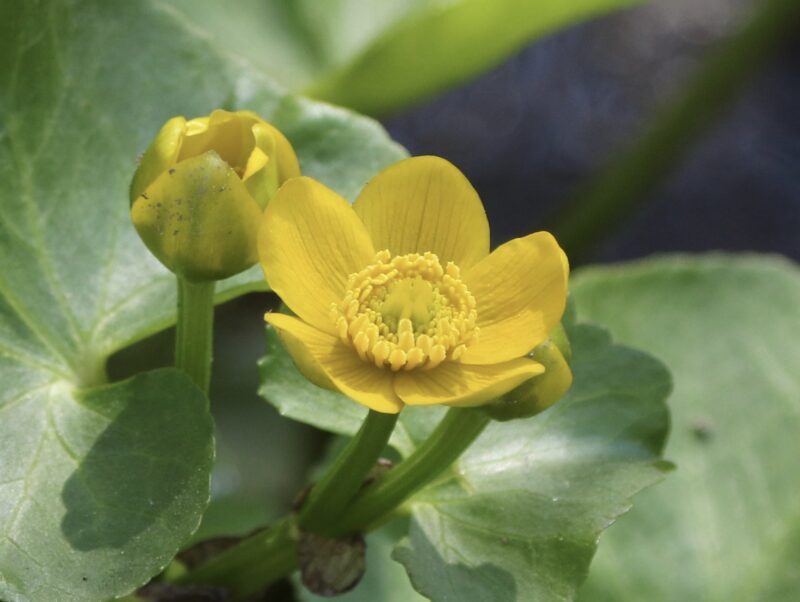My friend and sometime birding companion, Lynn Pady, recently sent me a copy of Gerard Manley Hopkins’ “The Windhover,” a poem about the bird we call a Kestrel. I don’t know for sure but suspect this may be a product of spring fever on Lynn’s part. It’s not the first time she’s emailed me this poem (may it not be the last!), and every time I see the damn thing, I have to stop what I’m doing to read it again, oh, for the something-hundredth time or so. Hopkins wrote “The Windhover” in the form of a sonnet, and it’s about as close to a fourteen-line piece of perfection as we’re likely to find on what Samuel Beckett has called “this bitch of an earth.”
I won’t quote the poem here, in whole or in part, because you can find it easily enough online or by thumbing through your favorite anthology. But for me, reading it again stimulated or brought on my own bout of spring fever, something that always prods me to think, for reasons I can’t explain, of certain poems I’ve loved for years. I do believe that spring and fall are the two for-want-of-a-better-word poetic seasons, while summer and winter, though each has its moments, just sort of sit around, hogging up space on the calendar. They are seasons to be endured rather than celebrated.
Among North American poets, no one (not even Frost) has celebrated spring more joyously or profoundly than e. e. cummings. In 1952, the year of my birth, cummings gave the Norton Lectures at Harvard University, which were published the following year as i: six nonlectures. Over many years, I’ve grown weary of pressing this book on everyone I meet, inevitably to no avail, so I won’t belabor the point of its greatness now other than to recommend as strongly as possible the second of the six lectures, which stands as, among other things, a monument, if monuments can consist of diaphanous, shape-shifting, petal-strewn materials, to the season of spring.
In the text of the lecture, cummings treats of his childhood, which is to say, his own personal spring, and at the end, he sort of sidles off to one side and surrenders the stage to a handful of his predecessors as he recites five exquisite tributes to the first season of the year. It’s well worth reading his own introduction to his fellow-poets, whom he insisted, quite rightly, on treating as his contemporaries. So here it is:
Let me now present, without socalled criticism or comment, five springtime celebrations which I love even more than if they were my own—first, a poem by Thomas Nashe; second, the opening of Chaucer’s Canterbury Tales; third, a chorus from Atalanta in Calydon by Swinburne; fourth, a rondel by Charles d’Orleans; and finally, a song by Shakespeare. Item: if these celebrations don’t sing (instead of speaking) for themselves, please blame me; not them.
Of cummings’ own works on spring, the one I care for most happens to be a poem you don’t see reproduced very often anymore: “spring omnipotent goddess.” And if you try to look this poem up online, you’re likely to find some bastardized or bowdlerized version that doesn’t agree at all with what cummings actually wrote. So I’ve taken the trouble of typing it out, copying the text line-by-line from the finest anthology of American poetry I know, F. O. Matthiessen’s The Oxford Book of American Verse. The poem overflows, it bubbles over with the mystery and excitement of spring: “the slobber of your thighs,” for example, is what Jorge Luis Borges might have called “a mighty line.” The season is fleeting; read and enjoy.
spring omnipotent goddess
spring omnipotent goddess thou dost
inveigle into crossing sidewalks the
unwary June-bug and the frivolous angleworm
thou dost persuade to serenade his
lady the musical tom-cat, thou stuffest
the parks with overgrown pimply
cavaliers and gumchewing giggly
girls and not content
Spring, with this
thou hangest canary-birds in parlor windows
spring slattern of seasons you
have dirty legs and a muddy
petticoat, drowsy is your
mouth your eyes are sticky
with dreams and you have
a sloppy body
from being brought to bed of crocuses
When you sing in your whiskey-voice
the grass
rises on the head of the earth
and all the trees are put on edge
spring,
of the jostle of thy breasts and the slobber
of your thighs
I am so very
glad that the soul inside me Hollers
for thou comest and your hands
are the snow
and thy fingers are the rain,
and I hear
the screech of dissonant
flowers, and most of all
i hear your stepping
freakish feet
feet incorrigible
ragging the world,
—e. e. cummings

This issue is so chock full of complexity, literary and otherwise, that I felt a need to stop and take a breath after each paragraph. These meaty entries need to be digested—but slowly, in order to comprehend each line and to enjoy the beauty of it. The whole piece takes me a long way from my favourite, “Nature’s first green is gold” and I might try out at least one of the non lectures. Yes, Spring is fleeting and especially in Toronto, where we might get a few days before summer bursts on the scene. Well done, Ed!
Thanks, Ed, for elevating the crude discourse of the day to words more beautiful and reflections more resonant. You sent me to my poetry shelf, my e.e.cummings and my Hopkins collections. And your own essay — a reminder that some people can still think beautiful thoughts and write to uplift my heart.
And later in the day, the car radio was quoting Chaucer’s Prologue while I was driving.
Perfect.